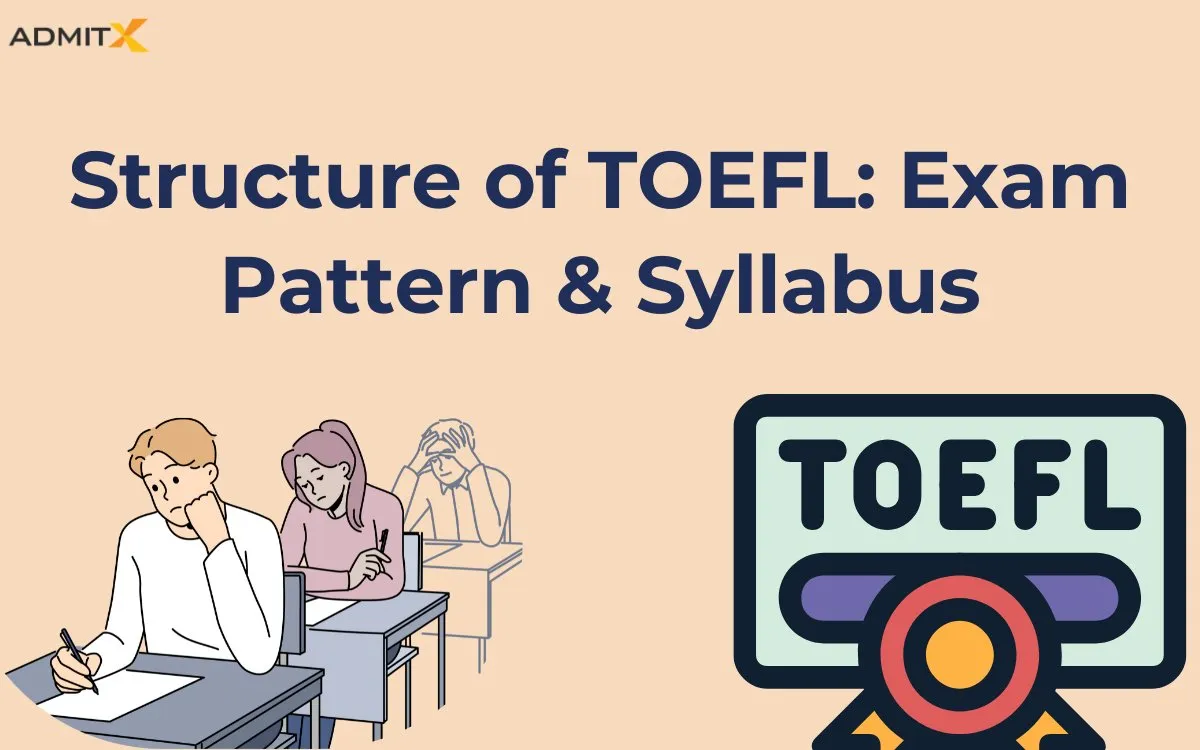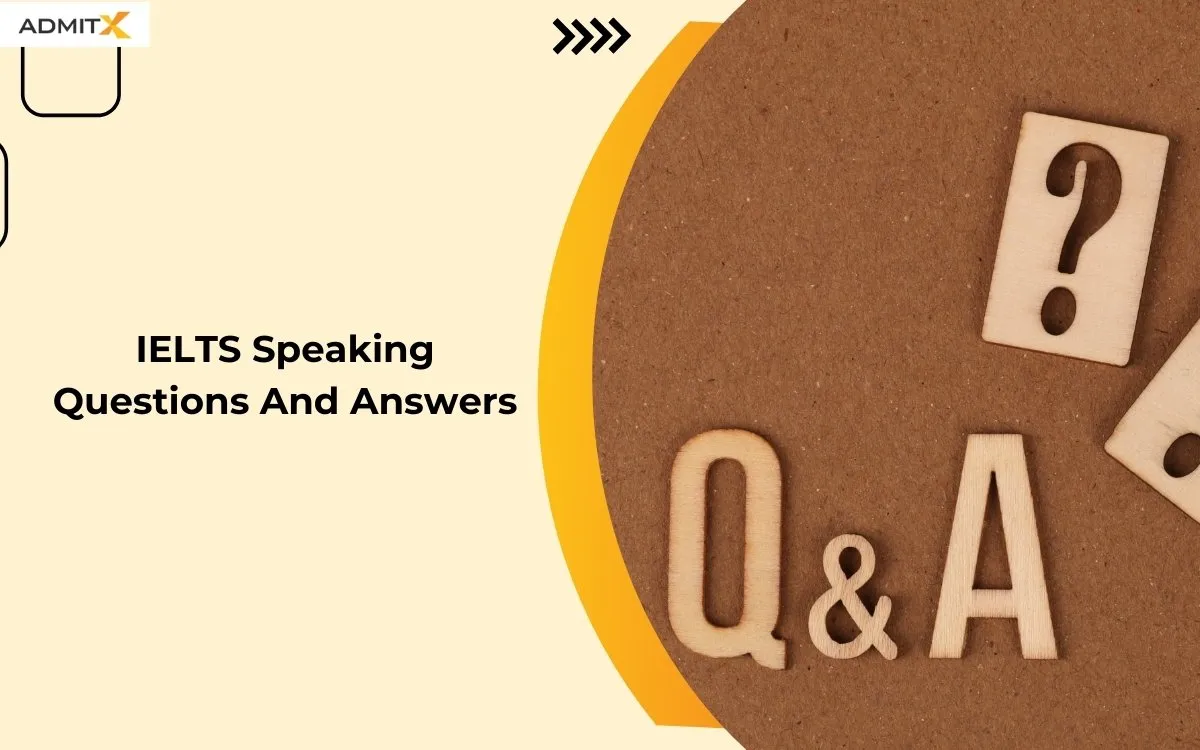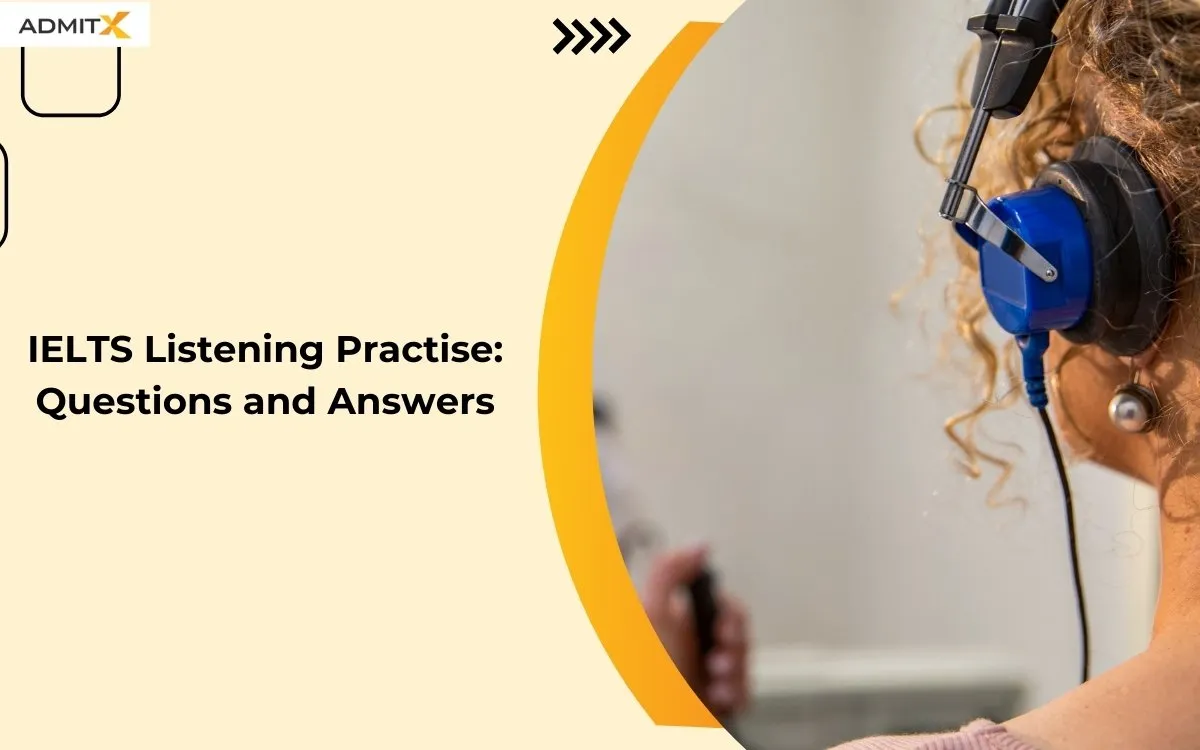
Structure of TOEFL: Exam Pattern & Syllabus
TOEFL, or Testing of English as a Foreign Language, is the world’s most popular and prestigious English language proficiency test. Almost every foreign university has adopted it to check aspiring students’ understanding and knowledge of English language skills like reading, writing, speaking, and hearing abilities.
TOEFL has become an essential requirement for admission into higher learning institutes in other countries.
Introduction of TOEFL iBT Exam
TOEFL, or Test of English as a Foreign Language, is a standardised exam that assesses the English language proficiency of individuals whose first language is not English and who want to pursue studies or work where English language competence is required.
The TOEFL iBT test is required to be admitted into colleges and universities in North America and Europe. The TOEFL iBT exam is valid for 2 years.
The TOEFL iBT test is conducted online, and students can undertake it either at home (home edition) or at centres.
In some universities, the TOEFL is an optional enrollment criterion, provided that the medium of instruction of the previous academic program was English.
Let us now discuss the importance and significance of the TOEFL iBT test for students preparing to pursue academic courses at foreign universities.
Importance of TOEFL iBT Test
Following are the reasons behind to appear for the TOEFL exam:
- Acceptance of TOEFL iBT Test: More than 13,000 universities accept TOEFL in over 160 countries because of its reputation and credibility. It allows students to take tests in a flexible and comfortable environment, making it a popular choice.
- Benefits & Opportunities: TOEFL strengthens English language communication skills, and its score helps them get high-paying jobs and university scholarships.
- World Wide Recognition: Most countries like the USA, the UK, Australia, Canada, New Zealand, etc., allow them to explore several reputable study and work opportunities abroad without any worry.
Editions of the TOEFL iBT Exam
As discussed above, there are two editions of the TOEFL iBT Exam, which students choose depending on their comfort and flexibility:
TOEFL iBT Test
- Students must appear in the test at the authorised test centre allotted by ETS.
- It is conducted six days a week at selected centres.
- It facilitates students’ appearing for exams under proper test conditions without distractions.
TOEFL iBT Home Edition
- The pattern, syllabus and curriculum are same as the centre edition.
- The exam time is open to students four days a week so that they can take tests anytime.
- Students are required to follow guidelines set by ETS before they start appearing for the test at home.
Also read – 10 Practical tips to boost your TOEFL Score
TOEFL iBT Exam Pattern
TOEFL is an English language proficiency test which requires rigid and comprehensive preparation to score well. Although there are no participation limits, but it is better to prepare strategically so that it can be cracked in one go.
It includes thoroughly understanding the syllabus by going through various aspects of the curriculum, such as sections, marking schemes, etc.
Overview of TOEFL iBT Exam
Following is the TOEFL iBT Exam overview, mentioning its important details in tabulated form.
| Official Website | https://www.ets.org/toefl.html |
|---|---|
| Duration | 2 Hours |
| Mode of Delivery | Internet-based test |
| Editions | TOEFL iBT Test TOEFL iBT (Home Edition) |
| Sections | Reading Writing Speaking Listening |
| Score | Between 0-120 (Total Score) Between 0-30 (Per Section) |
| Validity | 2 Years |
| Importance | Useful for university admissions and strengthening communication skills |
Overview of Test Sections
Below, we have provided the general breakdown of the different sections of TOEFL iBT, which includes information on the number of questions or tasks that students must complete in a given time with their descriptions.
The TOEFL iBT test emphasises integrating skills, e.g., reading, writing, listening and speaking, which helps students effectively communicate their ideas and opinions. The TOEFL iBT exam pattern is divided into four sections:
- Reading – 20 questions in 35 minutes
- Listening – 28 questions in 36 minutes
- Speaking – 4 tasks in 16 minutes
- Writing – 2 tasks in 29 minutes
| Sections | Questions/Task | Time Duration | Description |
|---|---|---|---|
| Reading | 20 questions | 35 minutes | Reading passages and responding to questions |
| Listening | 28 questions | 36 minutes | Q/A session based on classroom lectures and discussions |
| Speaking | 4 tasks | 16 minutes | Talk about a general and familiar topic |
| Writing | 2 tasks | 29 minutes | Stating the opinion or answer in written form based on classroom discussion |
TOEFL iBT Exam Pattern: Breakdown of Test Sections
Let us now analyse each TOEFL iBT test section in detail, as it is essential for students to understand the syllabus and content to design and follow strategies efficiently to get a good TOEFL score.
Reading Section
This section of the TOEFL exam syllabus is intended to check how well students can read and understand materials used in an academic environment.
Content: 2 passages, each of 700 words
Number of questions: 20 MCQs (10 questions per passage)
Time Duration: 35 minutes
Types of Questions
The reading section of the TOEFL iBT test consists of questions based on the following topics:
- Factual Information & Negative Factual Information: It asks students to recognise factual information or texts. It may include significant ideas, supporting details and definitions. Negative factual information asks students to find out the false answer to a question despite three of the four answers being true.
- Inference & Rhetorical Purpose: It asks students to identify information or comprehend an idea not clearly stated in the reading passage. Rhetorical purpose asks students why a particular idea is presented in the given question.
- Vocabulary: In the question based on the vocabulary section, one must find the meanings of words or phrases highlighted in the passage.
- Sentence Simplification: It asks students to choose a sentence from the given options with a similar meaning to the highlighted sentence in the passage and simplify it to imply significant meaning more simply.
- Inert Text Question: Such questions are based on the ability to place a new sentence in the given passage, provided that it would form a grammatical and logical connection.
- Prose Summary: It asks students to select the best possible option that represents the accurate and significant idea of the given passage.
Listening Section
The listening section of the TOEFL iBT test assesses the ability of the students to understand the conversations and lectures in English. It includes the testing of:
- basic comprehension
- understanding the intention of the speaker
- connecting information
Content: 3 lectures (3-5 minutes each) and 2 conversations (3 minutes each)
Number of questions:
- 6 questions per lecture (18 questions).
- 5 questions per conversation (10 questions).
Time Duration: 36 minutes
Types of Questions
The listening section of the TOEFL iBT test consists of questions based on the following topics:
- Gist Content and Gist Purpose: In such questions, students are asked to identify the primary purpose or idea behind the conversation or discussion.
- Detail: In this, students are asked to answer the questions based on the facts and figures to identify whether they have retained the information, based on conversation or lecture.
- Function: In such types of questions, students are asked to identify the exact or particular meaning of the sentence in a given context, provided that there may be various other meanings of the question.
- Attitude: The questions are designed to showcase the student’s ability to understand the feelings or attitude of the lecturer in the given conversation.
- Organisation: The students are asked to understand the structure of the discussion or conversation.
- Connecting Content: In these questions, students must elaborate on the relationships or connections between ideas in the conversation.
- Inference: Inference-based questions are designed to understand the analytical power of the students. Students must infer the meaning or main idea in the conversation when it is not directly stated.
Speaking Section
In the speaking section of the TOEFL iBT test, the students are evaluated to check their ability to speak English effectively in academic pursuits. The questions or tasks are designed so that they resemble the exact situations students go through during their stay in foreign countries.
Content: Tasks based on Independent speaking and Integrated speaking skills.
Number of questions: 4 tasks (45-60 seconds per response)
Time Duration: 16 minutes
Speaking Response: Students must talk into the microphone to respond to questions.
Types of Questions
The speaking section of the TOEFL iBT test consists of questions based on the following topics:
- Task 1 or Independent Speaking Task: Students must express their opinions, ideas and experiences in the discussion.
- Task 2-4 or Integrated Speaking Task: Students must combine their English-language skills — listening and speaking, or listening, reading and speaking as they are supposed to do inside and outside the classroom.
Writing Section
The writing section evaluates the students’ communication skills when they are in actual academic pursuits. It checks their ability to express their ideas or opinions clearly.
Content: A passage and online classroom discussion
Number of questions: 2 tasks
Time Duration: 29 minutes
Types of Questions
The writing section of the TOEFL iBT test consists of questions based on the following topics:
- Task 1 or Integrated Writing Task: Students must read or listen to a passage and write their understanding or ideas in response.
Time Duration: 20 minutes
- Task 2 or Academic Discussion Task: Stating an opinion in response to classroom discussion
Time Duration: 10 minutes
Also read – TOEFL: A Complete Guide
TOEFL iBT Test Syllabus: Covered Topics & Prep Books
Skills Requirements
The TOEFL iBT test syllabus contains general topics which evaluate the candidates on some parameters. Hence, students are required to prepare the syllabus by developing and polishing the following skills accordingly.
- Critical thinking
- Communication skills
- Active listening
- Observation
- Analytical skills
- Presentation quality
- Speaking fluency
- Listening comprehension
- Grammar
Syllabus
Although the TOEFL iBT exam pattern hasn’t changed, it is essential to know about the topics that it covers. There are no specific topics assigned for TOEFL.
However, students are expected to have a general awareness of society and the world. Students are only required to go through the test content and make responses appropriately as instructed.
The test content of the TOEFL derives from the following subjects/streams:
- Agriculture Sciences
- General Knowledge & Current Affairs
- Science & Technology
- Social Sciences
- Humanities
Eligibility of TOEFL iBT Exam
No specific criteria have been established for the TOEFL iBT test. Anyone belonging to any age group and having any educational background can apply to appear for the exam. Also, one can reappear for the exam multiple times since no participation limits exist.
Prep Strategy & Books
There are some essential tips on adapting, which one can start preparation for the TOEFL iBT test. These tips can be a part of day-to-day life, which most candidates apply for. Following are those tips which students can adapt to begin their TOEFL journey:
- Know and understand the TOEFL exam format well.
- Read English newspapers and magazines daily to build a solid vocabulary and reading habits. Some good examples are the Indian Express, The Hindu, Reader’s Digest, etc.
- Prepare notes of important topics/articles and infer your opinion or ideas.
- Listen to podcasts every day to improve your listening and interpreting skills.
- To maintain speaking fluency, start communicating with your friends, family members, and colleagues in English as much as possible.
- Take a mock test and analyse your results to make improvements.
Following is the list of some important books which can help students get a good TOEFL score:
- The Official Guide to the TOEFL iBT Test
- Speaking and Writing Strategies for the TOEFL iBT
- Delta’s Key to the TOEFL iBT: Seven Practice Tests
- Grammar Rules You Must Know To Guarantee Your Success On The TOEFL Exam
- Online course at TestDen
- Essential TOEFL Vocabulary Flashcard Kit
Conclusion
TOEFL iBT is the most reputed and credible English language proficiency test exam, which evaluates students in every aspect of their language skills like reading, listening, speaking and writing. It not only facilitates students in overcoming the language eligibility requirements set by universities but also provides them with a good understanding and knowledge of the English language, which they can appreciate.
The TOEFL preparation commences with an understanding of the test’s format, pattern, and syllabus, which helps students strategise their schedule appropriately.
FAQs
Is TOEFL a tough exam?
The TOEFL exam evaluates English language skills like reading, listening, speaking and writing, which doesn’t require students to follow a particular syllabus. All you need to do is remain aware of society and the world in a general sense and practice test papers by understanding the format thoroughly.
How many years is the TOEFL valid for?
The validity of the TOEFL score is two years. This has been done to ensure the candidate’s knowledge of English is up-to-date.
What is a good TOEFL score?
The total score of the TOEFL is between 0-130. Scoring 90-110 is considered to be competent enough to get admission into a top-ranking university.
If you are an aspirant looking to study at your dream university, book an appointment with AdmitX today and start your applications early to avail yourself of all the benefits.








